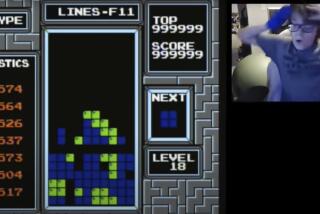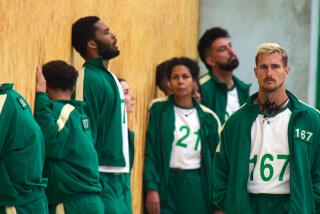This Could Spell Trouble
- Share via
As much as I understand the draw of a game like Scrabble, the allure of being the best at something so arcane, I’m hoping to prove resistant. True, I fit all the criteria for a Scrabble junkie: Fascinated by words, I like to win contests at any cost and am more than a little obsessive. Plus, I’m scheduled to play Stefan Fatsis, a top-ranking Scrabble expert who has just written “Word Freak: Heartbreak, Triumph, Genius and Obsession in the World of Competitive Scrabble Players” (Houghton Mifflin).
Fatsis, a sports reporter for the Wall Street Journal, ranks as an expert, “the 180th or so best Scrabble player in North America.” I’ve nothing to recommend me beyond cutthroat vigor coupled with a foolishly obdurate desire to win. I pull my dusty Scrabble set from the back of the games closet, the theme from “Rocky” playing in my head. It’s time to get in shape.
With “Word Freak,” Fatsis has written a can’t-put-it-down narrative that dances between memoir and reportage, including a comprehensive history of the game. The main thread recounts his descent, after his interest was piqued by a Sports Illustrated article, into the weird and genius-laden subculture surrounding the board game--over the course of the book he morphs from an interested observer to a chronic Scrabble zealot--while profiling the quirky, savant compatriots who befriend him.
There’s Matt, a stand-up comedian hooked on smart drugs who once wrote for “Saturday Night Live”; Joe Edley, a three-time national champion who plays Scrabble by following Zen tenets; and another world champion who’s earned the moniker “GI Joel” for the gastrointestinal problems that plague him.
Reading his book, I feel the pull along with him, the sense of being sucked in, little by little, fearful of realizing the danger only after it’s too late.
“I wonder what my obsession is proving,” Fatsis writes in the midst of his journey to becoming a top-ranking Scrabble competitor. “Maybe nothing. Maybe more than I care to admit. With the board and tiles and word books splayed across my living-room floor, and my regular circuit of tournaments, and leaving work early on Thursdays to get to the club on time, I have managed to reorder my life so that I can play a board game. This doesn’t seem healthy, especially because I still [stink]. But it doesn’t seem avoidable either .... I’m having trouble typing these words, but right now Scrabble is the most important thing in my life.” As I prepare for the Scrabble showdown, my father, an unwitting victim, stops by. I coerce him into a game, the first I’ve played in at least a year, and win: 286-210. A decent start, but, having read “Word Freak,” I know much more is needed. Instead of relying on the words that spring to consciousness, I should be studying and memorizing the official Scrabble reference book, a volume I don’t own, which lists all 110,000 acceptable words. I’m off to the bookstore.
“Playing competitive Scrabble is really no different, no more obsessive, than any other specialized activity,” Larry Squire, professor of psychiatry, neuroscience and psychology at the UC San Diego School of Medicine, assures me. He should know. In addition to being one of the country’s leading experts on memory and the brain, Squire was once a competitive Scrabble player.
“If you look at any kind of human endeavor,” he says, “especially those that are not remunerative, you’ll see the same thing. Any specialized activity looks extreme from the outside.” Squire’s Scrabble career and those of his peers, he tells me, were not characterized by profound eccentricity. “You might look at the subculture of demolition derbies and think it’s a little odd, but of course it looks odd if you’re not a part of that culture.”
Not the Game You Play
in Your Living Room
As much as I like Scrabble, I’m concerned. I didn’t realize before reading Fatsis’ book how different competitive Scrabble is from the living-room variety. Looking at boards from the competitive levels reproduced in Fatsis’ book, one can’t be sure the game’s even being played in English.
Bizarre words litter the playing field: “serifed,” “entailer,” “mannite,” “foceal,” “novercal,” “mattoics.” Serious players study these odd words, memorize “bingo” possibilities (in which players use all their letters on a single turn, earning a bonus 50 points), commit to memory the 10 “Q” words that don’t contain a “U” (qat, qaid, qoph, faqir, qanat, tranq, qindar, qintar, qwerty and sheqel) and master countless lists of words that are highly prized in Scrabble but virtually worthless in the everyday world.
I average 250 to 300 points a game, taking all the time I need. I learn from “Word Freak” that expert-level scores routinely run 400 to 600, sometimes peaking in the 700s. Plus, the competitors play under a time constraint: 25 minutes per player per game.
“I have a gripe with these unfamiliar words,” I tell Fatsis before our showdown, “because they remove the poetry I like in Scrabble, the way words make odd bedfellows with each other based on the pull of tiles and the players’ mastery of words.”
“That’s the first thing people have to get over if they decide to play competitively,” he tells me. “They think it’s a word game, but really, it’s a math game.” The reality he describes is off-putting to hear and even more difficult to accept. “That many of the words used in competitive Scrabble are not part of our daily vocabulary is the fundamental conceit one has to accept--or not--with this game.” (As an aside, the spell-checker on my computer went ballistic checking this story.)
So I download the list of 96 acceptable two-letter words from a Web site and try to memorize them, hoping to see the 50-point increase in average scores the site promises. Only two words stick: “Ai,” a three-toed sloth, and “Aa,” a rough, cindery lava. I play a game against myself at the kitchen table feeling more than a little misanthropic.
I score lower than usual on both sides.
“I’m a Scrabbling Sisyphus, sentenced to scratch and claw my way up the tournament ranks only to be knocked down again,” Fatsis writes, and yet he claims some kind of freedom in that knowledge. “I have chosen to push the rock up Mount Scrabble. Only my shortcomings send it tumbling back down.”
Why would one go to this much trouble to master a bunch of words that no one, other than fellow Scrabble-heads, would recognize? Fatsis explains: “It’s beautiful, seeing these letters arranged in a particular order, having symmetry and geometric beauty. You can’t find that anywhere else.”
He illustrates his sense of awe with the word “oquassa,” a kind of trout. He’d been playing a game recently when he found the opportunity to use that word, which hitherto had been only a combination of letters with a theoretical possibility.
“I had studied all the seven-letter words that contained a Q,” he explains, and though he didn’t know the meaning of many of them and couldn’t remember every one, suddenly the makings of “oquassa” were on his rack.
“It was there, as if I’d been touched by God. That’s a once-in-a-lifetime occurrence. I knew the word existed, and here, I saw it. I knew where to use it. I recognized the opportunity.” His voice grows ecstatic. “It was as if the planets were aligned, a harmonic convergence.”
But let’s be clear: There’s more than an appreciation of aesthetics at stake. Winning is the name of the game. This comes through plainly after Fatsis somberly admits his ranking has dropped in recent months from the 1,700 “expert” level he’d attained at the end of the book. (Competitive players earn ratings based on their tournament scores; rankings can top out at more than 2,000.)
Within days of that admission, he e-mails me: “I took first place in that tournament last weekend! I won seven of nine games and my first expert-division victory. My rating--phew--should return to the 1,700 level.”
There are 2,300 active tournament players across the nation. Recent world championships have had top purses as high as $15,000 and $25,000.
I feel that same desire to win, to prove myself, and yet I know I’m doomed.
It’s ‘Bun’ Versus ‘Fohn’
in a Scrabble Showdown
We meet for our game at a hotel in Pasadena. I’m nervous. He’s now ranked near 1,750. My one realistic hope is to make a decent showing and not seem the idiot I’m now sure I must be.
Fatsis appears at ease, knowing I’ll be an easy match. He’s kind, with intense, dark eyes penetrating through dark-edged glasses.
I draw an E and win the opening move, which I bungle with the 10-point word “bun.” The running clock only adds to my anxiety. Soon, though, the hypnosis of Fatsis’ intensity--or is it my own?--takes over. We hardly speak. The rustle of tiles is the only sound.
The clock keeps moving forward. He plays “avocets,” “exon” and “fohn,” words I look up the minute he lets go of the tiles. In my penultimate move, I make a bingo with the word “pressure”--a fitting choice, it seems--and want to yelp with joy; it’s the first bingo I’ve ever made. Fifty-seven points on that one move alone.
The tiles disappear from the red velvet bag one by one until Fatsis clears his rack and calls the game to an end. There’s less than a minute left on my clock. The final score is 295 to 369--I lose by 74 points. A reasonable finish, I tell myself. But it’s not over.
We then play another round, what he calls a “consultation game” in which he helps me with the letters I draw to find possibilities unfamiliar to me. Fatsis tells me to dump letters I would otherwise have made a play with (players can select as many new tiles as they like, but in doing so forfeit their turn); “they’re not worth it,” he explains.
He shows me how to keep letters I might need for the next play and thereby balance my rack. He won’t let me use an S or a blank unless I can score big with them. He urges me to find lurking bingos until I actually begin to see them.
I should leave; I’m sure my car is getting a parking ticket this very moment. I don’t budge. Not yet. I can’t stop. We play and play and play. I actually win this game, albeit with his extraordinary help, 402-394, scoring three bingos in the process. Three hours after we started, I finally pull myself away. We’ve played through lunch and only on the drive home do I realize I’m starving.
Louder than the growl in my stomach, though, is the vow on my lips: Next time, I’ll really memorize those two-letter words. Then I’ll work on the three-letter ones. I’ll pay attention to my rack management. I’ll bingo regularly. I’ll learn it all, every word, until I’m invincible, a Scrabble force to be reckoned with. And then, Mr. Fatsis, watch out.
More to Read
Sign up for our Book Club newsletter
Get the latest news, events and more from the Los Angeles Times Book Club, and help us get L.A. reading and talking.
You may occasionally receive promotional content from the Los Angeles Times.










